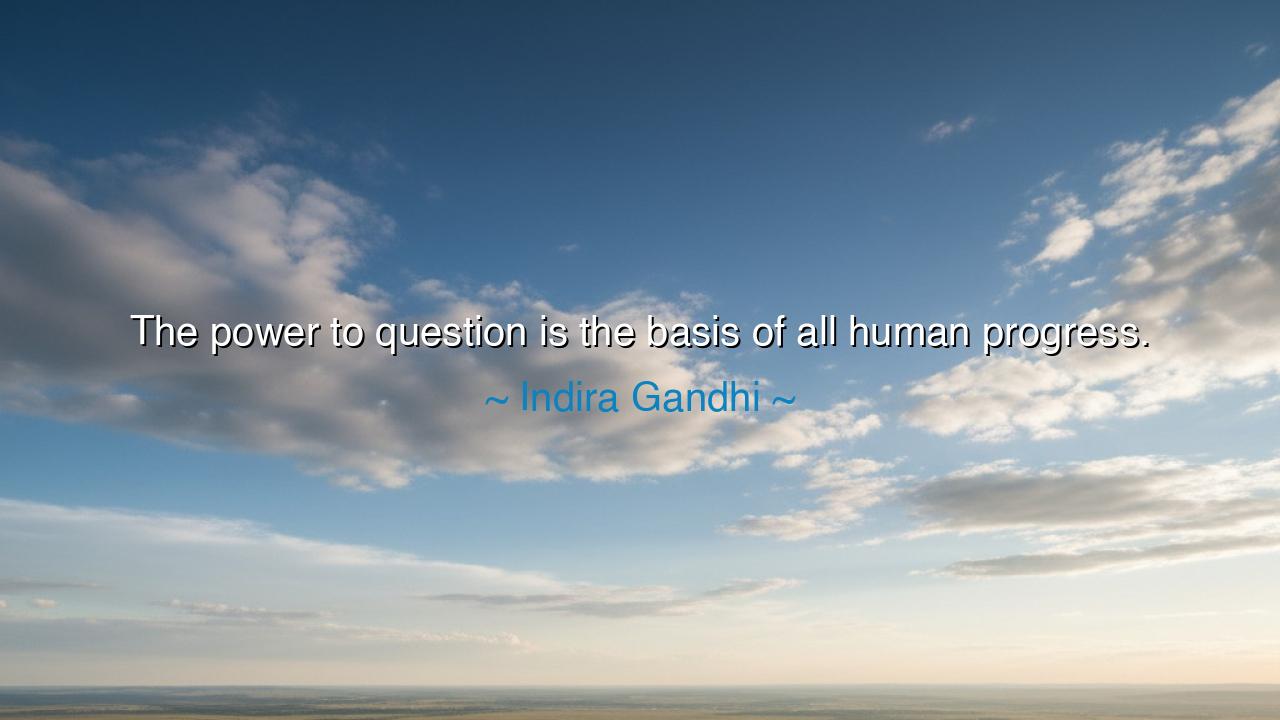
The power to question is the basis of all human progress.






Questions are the sparks that ignite the fires of progress. When Indira Gandhi proclaimed, “The power to question is the basis of all human progress,” she spoke of a force greater than armies or empires—the courage of the human mind to challenge, to seek, and to discover. To question is to pierce the veil of ignorance, to refuse blind obedience, and to demand understanding. Without this sacred power, mankind would remain forever chained to superstition and tyranny, stagnant like a still pond beneath a dark sky.
Throughout the ages, every leap forward has begun with a single question. When Socrates walked the streets of Athens, he asked his fellow citizens to examine their beliefs. His relentless questioning shook the foundations of power, ultimately leading to his trial and death. Yet his legacy birthed philosophy, forever altering how humanity understands itself. Likewise, Galileo Galilei, by questioning the heavens, defied the mighty Church and revealed truths about the cosmos that transformed our vision of the universe. Their courage shows that questioning is not mere curiosity—it is rebellion against falsehood.
Indira Gandhi herself understood this truth deeply. As Prime Minister of India, she witnessed a nation rising from the chains of colonialism, its people questioning centuries of foreign rule and oppression. The freedom movement led by figures like Mahatma Gandhi was born not only from physical resistance but from a questioning of deeply entrenched beliefs: Why should one nation dominate another? Why should injustice be accepted as fate? These questions planted the seeds of independence and inspired millions to stand up for their rights.
History also warns of the cost of silence. In times of tyranny, rulers often demand unquestioning obedience, for they know that a single question can unravel their power. The Inquisition burned those who dared to ask forbidden questions. Totalitarian regimes crush dissent to protect their illusions. Yet no force can truly kill the spirit of inquiry, for it lives in the heart of every free soul. When people stop questioning, they cease to grow; when they begin again, revolutions are born.
To question is to open the gates of possibility. It is the first step toward invention, reform, and enlightenment. From the discovery of fire to the exploration of the stars, every achievement began with someone asking, “Why?” or “What if?” The child who dares to question may grow into the thinker who changes the world. Thus, questioning is not weakness, but strength, the foundation upon which all progress stands.
Let future generations hold this teaching close: never surrender the power to question. It is the torch that lights the path through darkness, the sword that strikes down ignorance, and the seed from which liberty and truth grow. For as long as humanity questions, humanity evolves—and the dawn of progress will never fade.






TTLe Trung Thang
This quote makes me think about the role of questioning in education. We often encourage students to ask questions to stimulate learning, but are we providing them with the tools to ask the right kinds of questions? How can we create environments where curiosity is nurtured in a way that leads to meaningful progress rather than just confusion or rebellion? In a world where answers are often more valued than the questions themselves, how do we shift that mindset?
PLPhuc Le
I find this quote empowering, as it promotes the idea that asking questions is a key to evolving. But does it mean that anyone who questions is automatically contributing to progress? What about the ones who question for selfish reasons or to disrupt without offering solutions? Does questioning always lead to positive outcomes, or could it be dangerous in certain contexts, like when used for manipulation or creating division?
UGUser Google
Indira Gandhi's words resonate deeply with me. The ability to question is fundamental to challenging existing norms, yet we often see people discouraged from questioning authority or tradition. How do we encourage the younger generation to question constructively, without crossing into disrespect? Do we, as a society, sometimes inhibit the progress that questioning brings, perhaps out of fear of change or discomfort with new ideas?
TTNguyen Tuan Tu
This quote really makes me reflect on the importance of curiosity. It’s amazing how questioning things can lead to change and progress. But I wonder, are there ever situations where questioning might hinder progress, especially in areas that require immediate action or strict adherence to rules? Can too much questioning lead to paralysis by analysis in some cases? I guess it’s about finding a balance between questioning and decisiveness.